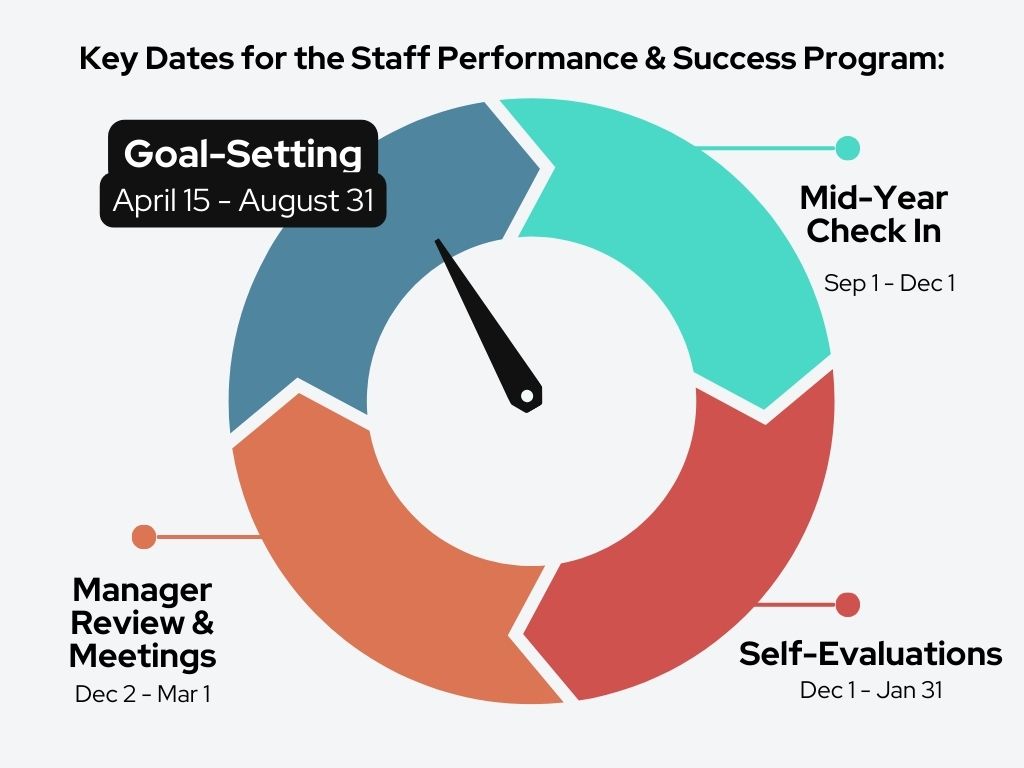In March, Human Resources introduced the first version of a more simplified and intuitive performance process. After campus could visualize and understand the changes in real time, additional feedback was collected to further develop a timeline closely aligned with the academic year, while still maintaining university budget and planning deadlines.

Refreshed Timeline
The refreshed cycle consists of four clear, easy-to-follow steps:
- Goal Setting:
April 15 – August 31, 2025
Staff set goals with their manager at the start of the academic year. These goals can be adjusted as responsibilities evolve because Goal Setting stays open until Self Evaluations are complete. - Mid-Year Check-In:
September 1 – December 1, 2025
A conversation between employees and managers to reflect on progress and make any needed updates. The system provides an actionable way to document these conversations and track goal achievement. - Self-Evaluation:
December 1, 2025 – January 31, 2026
Employees reflect on accomplishments and challenges, and submit their self-evaluation directly to their manager to move the process forward, as soon as December 2 and no later than January 31.
- Manager Review & Meetings:
December 2, 2025 – March 1, 2026
Managers complete the final review using input from goal setting and check-ins to support meaningful feedback, all within the academic year. If the manager step is not initiated by the employee, Human Resources will move managers into this step on February 1.
The updated menu in Page Up reflects these new steps:

Simplicity and Support Year Round
Performance development is strongest when conversations are ongoing, during formal moments like a scheduled 1:1 or more informal moments such as a conversation during a campus walkabout. Whether you're setting goals, checking in mid-year, or reflecting on the year’s work, the system and structure make it easy to document and share feedback.
There’s no need for long forms or unnecessary uploads. Managers and employees can focus on what matters most: how well we’re working toward our goals, where support is needed, and how to keep growing—together.
What If I Already Entered Goals?
If you’re one of a small number of staff who entered Goals when the 2025/2026 Performance cycle opened in mid-April, don’t worry! Human Resources transferred your goals behind the scenes within Page Up before launching the new format. There is just one quick step needed from you to fully activate them for the next steps of the cycle.
When you log into Page Up Performance, select the “Goals” tab. There you’ll see your goals and notice they are no longer linked to a specific Value. For each goal, select the value it supports. The system automatically saves this type of change. Add any new goals you may be pursuing this year.
Remember, goal achievement is just one aspect of succeeding as an employee at TCU, and why it’s important to relate the work you do to the TCU Values.
Connecting Performance to Purpose
Performance conversations are a way to be forward-thinking and align everyday work with the university's values of Integrity, Excellence, Community, and Innovation. They also connect each role—no matter the department—to TCU’s four strategic pillars:
- Student-Centered Growth
- Research, Scholarship, and Creative Activities
- Athletics
- Community Engagement
Whether you’re teaching, advising, repairing, planning, or supporting, the work you do shapes the student and employee experience at TCU. Great performance leads to stronger outcomes, and the updated cycle gives everyone a clearer path to success.
Continue the Conversation
By checking in regularly, employees and managers strengthen trust, clarify priorities, and create space for meaningful accomplishments. This simpler structure is designed to have better conversations, build stronger teams, and support the mission of TCU in every role across campus.
Stay tuned for more updates, tips, and resources to help you lead and grow as a colleague and employee at TCU. For questions specific to your team or personal situation, reach out to HRemployeesuccess@tcu.edu.